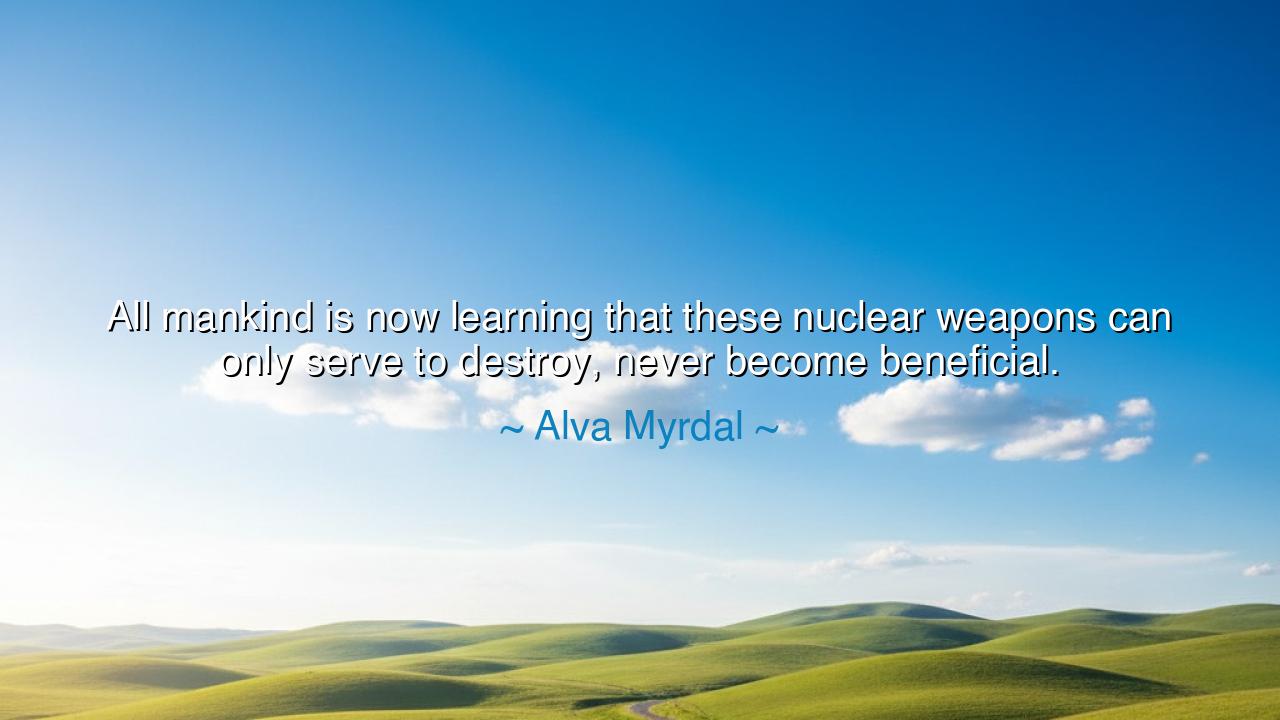
All mankind is now learning that these nuclear weapons can only
All mankind is now learning that these nuclear weapons can only serve to destroy, never become beneficial.






In the solemn and prophetic words of Alva Myrdal, diplomat, reformer, and advocate for peace, we hear the grave wisdom of one who has gazed into humanity’s shadow: “All mankind is now learning that these nuclear weapons can only serve to destroy, never become beneficial.” Spoken during the tense years of the Cold War, these words rise beyond their time — a warning carved into the conscience of civilization. Myrdal, who devoted her life to disarmament and the preservation of peace, saw clearly what many still refused to believe: that there are creations of the human hand which possess no moral redemption, tools so absolute in their power that their very existence threatens the soul of the world.
To learn that nuclear weapons “can only serve to destroy” is to confront the bitter fruit of human progress. From the dawn of the atomic age, mankind believed itself to be standing at the threshold of godlike mastery — to wield the power of the sun itself. The scientists of Los Alamos, when they first split the atom, felt both awe and dread. One of them, J. Robert Oppenheimer, upon witnessing the first explosion, quoted the Bhagavad Gita: “Now I am become Death, the destroyer of worlds.” In that instant, humanity had crossed an invisible line — the point at which knowledge had outpaced wisdom. Myrdal’s words speak to that moment of reckoning, when humankind must admit that not all learning leads to life, and that power without compassion turns creation into ruin.
The ancients, if they could have heard her, would have understood her warning. They too knew that the hubris of power leads inevitably to downfall. The story of Icarus — who soared too near the sun on wings of wax — is reborn in every age, and in ours, the wings are nuclear. What was once myth has become reality: a single act, a single spark, can consume cities and generations. Myrdal’s insight pierces through the veil of pride and technological triumph, reminding us that there is no victory in annihilation. The sword that is too sharp cuts not only the enemy but the hand that wields it.
In the mid-twentieth century, Alva Myrdal stood among the voices of conscience that refused to bow to fear or politics. She served as Sweden’s disarmament ambassador and tirelessly called for an end to the arms race between the great powers. While others justified the bomb as a deterrent — a supposed “balance of terror” — Myrdal saw the moral bankruptcy of such logic. She knew that no weapon of such scale could ever be truly controlled. To build it was to accept the possibility of using it; to possess it was to invite its curse. Her words were not spoken in despair, but in moral defiance — the courage to declare that some knowledge must be met not with pride, but with restraint.
Consider the devastation of Hiroshima and Nagasaki, where the promise of science became a dirge for humanity. In a single morning, two cities were turned to ash, and hundreds of thousands perished — not soldiers, but mothers, children, and elders. The survivors carried scars, both physical and spiritual, that became the eternal testimony of Myrdal’s truth. No nation, no ideology, could call that destruction “beneficial.” And yet, the world continued to build more, as if determined to test its own extinction. It is this madness that Myrdal sought to name — the illusion that there can be peace through fear, or safety through destruction.
Her words reach beyond politics and speak to the moral awakening of humankind. To say that mankind is “now learning” is to acknowledge that this lesson is slow and painful, written in suffering and near-catastrophe. But still, there is hope — for if destruction can be learned, then so can peace. Myrdal believed that humanity could grow wiser than its weapons, that education, compassion, and cooperation could one day replace the cold arithmetic of deterrence. The true evolution of mankind, she taught, would not be in building greater power, but in cultivating greater restraint.
So, my children of the future, let this lesson echo in your hearts: power without wisdom is ruin. Learn not only to create, but to question what you create. Seek not mastery over the earth, but harmony with it. Remember that the hand that can destroy the world also holds the power to heal it — to plant, to write, to mend, to make peace. Every generation must choose anew between the fire that burns and the light that guides.
Thus, let Alva Myrdal’s warning stand as both prophecy and promise: “These nuclear weapons can only serve to destroy, never become beneficial.” It is a truth as radiant and terrible as the light of the bomb itself — but unlike that flash, it offers illumination, not obliteration. Let it remind you that the greatness of humanity does not lie in the power to destroy, but in the courage to protect life, even when it demands humility, sacrifice, and hope. For in that choice, we prove ourselves not gods of fire, but guardians of the earth.






AAdministratorAdministrator
Welcome, honored guests. Please leave a comment, we will respond soon